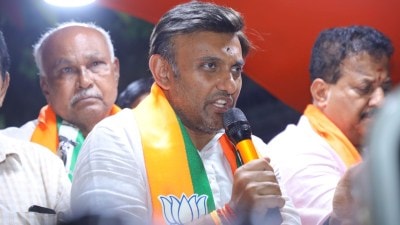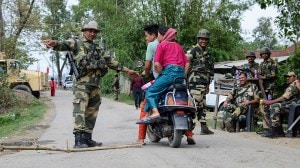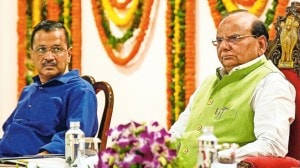- India
- International
Railways add second water rake for parched Bhilwara
Ministry of Environment and Forests gives nod to incomplete 1.6 km section of the 141 km pipeline project linking district to Chambal river.
Even as the soaring temperature in Rajasthan breaks records and the water crisis worsens in Bhilwara district, Indian Railways has added a second train to the existing water special — doubling the water provided to Bhilwara city through trains to 50 lakh litres a day.
In another relief for Bhilwara residents, the Lucknow region office of Ministry of Environment and Forests on Monday cleared a 1.6-km pipeline section, the only incomplete section, on a 141-km pipeline that will soon connect the district to Chambal river, increasing the supply of much-needed water.
“We were demanding an additional train to meet the surging demand-supply gap and had been pursuing it with the district administration and Public Health Engineering Department (PHED) Minister Kiran Maheshwari,” said R K Ojha, Superintending Engineer, PHED, Bhilwara. “The Chief Minister and the state government took it up with the Union government and the second water special was flagged off last week,” he said.
Since January 19 this year, a water train has been running between Ajmer and Bhilwara. Its 50 wagons, each with capacity of 50,000 litres, are filled with water from Bilaspur dam, after filtration, at Nasirabad railway station in Ajmer and sent to Bhilwara.
The new train would, however, mean only a marginal increase in total water supply for the city. Bhilwara city’s water demand is about 52 MLD (520 lakh litres) daily, while that of the entire district is 191 MLD. The city currently receives 125 lakh litres daily from limestone aquifers in Kachola Ghati (near Banas river) and 40 lakh litres from Meja dam. Another 50 lakh litres are sourced daily from saline water tubewells (for other uses), and now 50 lakh litres from the two water trains. The district has also started bringing 7 lakh litres daily by road from neighbouring Chittaurgarh.

Hence, despite the measures, there is still a dearth of about 250 lakh litres daily in the city area. Ojha said that each household receives water supply for a few hours every 96 hours.
“The current supply from aquifers and Meja dam are a little less than what we were receiving a couple of months ago. So, before the second water train was pressed into service, some households were getting water once every 144 hours (six days), while 40 per cent households were getting water once every 120 hours (five days). Now we have restored the 96-hour cycle,” he said.
Bhilwara’s problems are mainly due to the delayed phase 1 of Chambal-Bhilwara Water Supply Project — sanctioned in 2011 — which will connect the district to the Chambal. The project was scheduled to be completed last year. “There was an issue of a few kilometres of pipeline, which was awaiting clearance from the MoEF, which has now been sorted. According to the PHED minister, who visited the site recently, phase 1 will be commissioned by August,” said Subir Kumar, PHED Secretary.
“Only 1.6 km had been awaiting clearance until Monday, when it was given an in-principle approval,” said Karni Pratap, Executive Engineer, PHED Rawatbhata.
Phase 1 aims to meet Bhilwara district’s supply for the next 15 years. Sourcing water from Chambal at Bhainsrorgarh, the pipeline will take it to a treatment plant 48 km away in Aroli, and then 93 km away to Bhilwara. Its full capacity of 245 MLD in phase 1 will meet Bhilwara district’s demand, which is estimated at 243 MLD by 2030.
Apr 27: Latest News
- 01
- 02
- 03
- 04
- 05








































